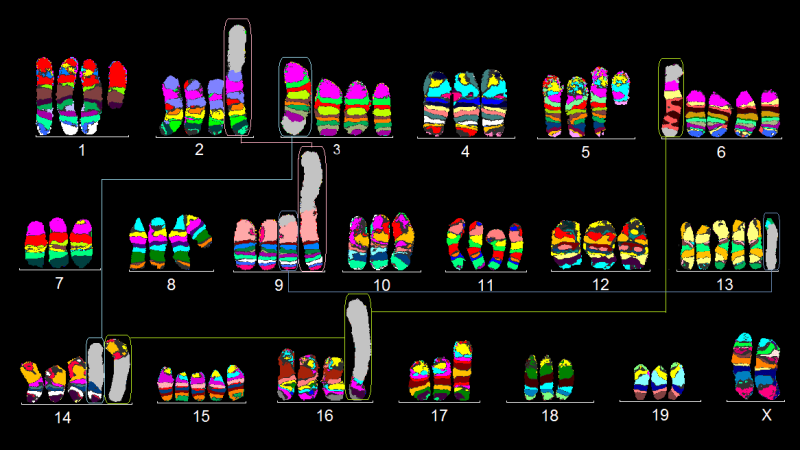Molecular Cytogenetics
Murine multicolor banding (mcb) was applied on chromosomes of the JC breast cancer cell line.
Graphic: Thomas Liehr aus Azawi et al. (Mol Cytogenet, 2021)Research topic(s)
Cytogenomic characterization of murine tumor cell lines and human leukemias
The Molecular Cytogenetics group has expertise and a collection of DNA probes that is unique in the world and is better suited than many other methods to characterize cryptic genetic / chromosomal modifications.These probes (partly self-created using glass needle-based chromosome microdissection) are put together in individual probe sets, and depending on the problem used in multicolor fluorescence in situ hybridization (FISH). In recent years, the murine samples have enabled the first cytogenomic characterization of about 20 murine tumor cell lines. Furthermore, otherwise unexplained complex human leukemia cases or certain solid tumor models have been and are being processed in international cooperations. All of this led and continues to lead to a large number of publicationsExternal link.
Methods
The Molecular Cytogenetics group has been specializing in multicolor fluorescence in situ hybridization (FISH) methods for more than 20 years, and is one of the few laboratories worldwide that can perform glass-needle-based chromosome microdissection. In cooperation with the Leibniz Institute on Aging - Fritz Lipmann Institute (FLI)External link, the technique of molecular combing is also available.Banding cytogenetics and array-comparative genomic hybridization (aCGH9 are available for corresponding questions in neighboring laboratories (Dr. Weise, Dr. Mrasek) within the Institute of Human GeneticsExternal link.
Selected Publications
Capela de Matos RR, Othman M, Ferreira GM, Monteso K, de Souza MT, Rouxinol M, Melo JB, Carreira IM, Abdelhay E, Liehr T, Ribeiro RC, Silva M. (2022) Somatic homozygous loss of SH2B3, and a non-Robertsonian translocation t(15;21)(q25.3;q22.1) with NTRK3 rearrangement, in an adolescent with progenitor B-cell acute lymphoblastic leukemia with the iAMP21.External link Cancer Genet, 262-263:16-22
Koltsova AS. Efimova OA, Malysheva OV, Osinovskaya NS, Liehr T, Al-Rikabi A, Shved NY, Sultanov IY, Chiryaeva OG, Yarmolinskaya MI, Polenov NI, Kunitsa VV, Kakhiani MI, Tral TG, Tolibova GK, Bespalova ON, Kogan IY, Glotov AS, Baranov VS, Pendina AA. (2021) Cytogenomic profile of uterine leiomyoma: In vivo vs. in vitro comparison.External link Biomedicines, 9(12):1777
Kadioglu O, Saeed MEM, Mahmoud N, Azawi S, Mrasek K, Liehr T, Efferth T. (2021) Identification of novel drug resistance mechanisms by genomic and transcriptomic profiling of glioblastoma cells with mutation-activated EGFR.External link Life Sci, 284:119601
Piaszinski K, Rincic M, Liehr T, Azawi S. (2021) Molecular cytogenetic characterization of the murine melanoma cell lines S91 clone M3 and B16-F1 with variant B16-4A5. External linkCytogenet Genome Res, 161(1-2):82-92
Azawi S, Rincic M, Liehr T. (2021) Cytogenomic characteristics of murine breast cancer cell line JC.External link Mol Cytogenet, 14(1):7
Links
Homepage of Thomas LiehrExternal link

